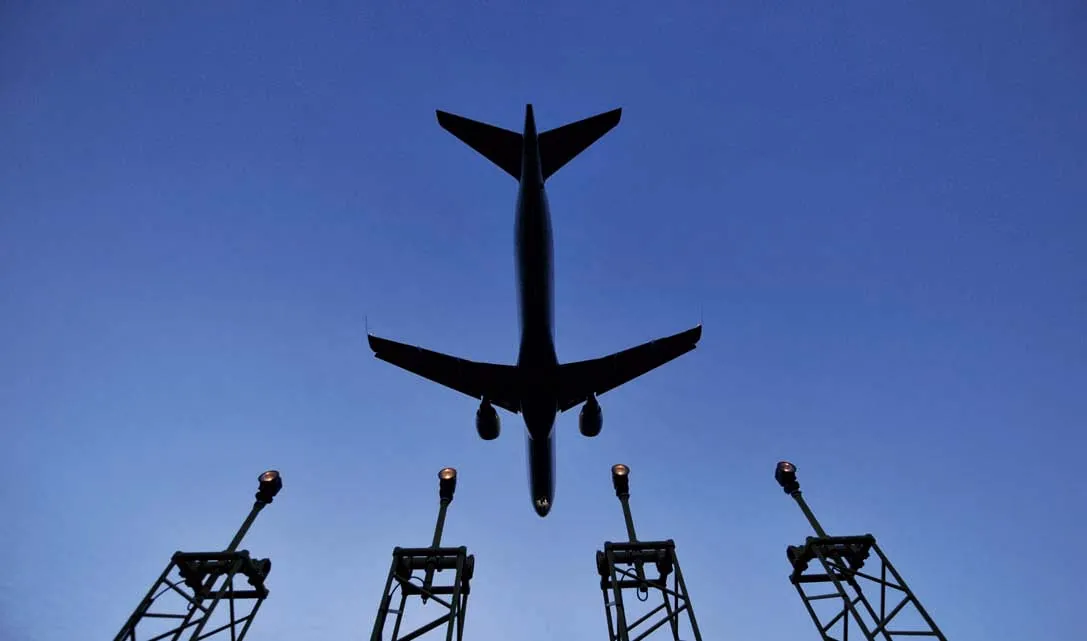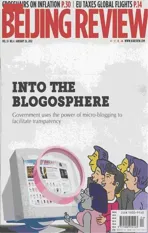Unfriendly Skies
2012-10-16AirlinesaroundtheworldareangryovernewEUemissionstaxonflightstoEuropeByYuLintao
Airlines around the world are angry over new EU emissions tax on flights to Europe By Yu Lintao
Unfriendly Skies
Airlines around the world are angry over new EU emissions tax on flights to Europe By Yu Lintao

FLYING AT HIGHER COSTS: A plane lands at Brussels, Belgium. The new European regulations on carbon emissions by airlines came into force in January despite widespread opposition
The European Court of Justice dismissed a lawsuit by a group of U.S.airlines on December 21, 2011, and upheld that airlines based outside the EU must abide by EU legislation which imposes a carbon cap-and-trade scheme on international flights that take off or land at European airports. Early this year, Chinese airlines announced they will refuse to pay any charges under the scheme.
In addition to the United States and China,other nations have also raised complaints, with some critics claiming the EU is intervening in the competition between Airbus and Boeing.
The ruling was the final European-level judgment on the EU’s carbon tax on airlines using European airports, which took effect from the beginning of 2012.
Although the United States has failed in its challenge to the new tax, Chinese airlines are planning to follow the United States and file a suit against the EU. The China Air Transport Association (CATA) has asked all its member airlines not to comply with the EU plan.
So far the Chinese Government has kept a cautious attitude toward the issue. Foreign Ministry spokesman Liu Weimin said China hopes the EU will act with caution and settle the issue in a positive and pragmatic way through consultation with relevant countries.
Chinese analysts say the move not only infringes on national sovereignty and violates international aviation treaties, but also is a trade barrier in the name of environmental protection, and at the cost of the interests of travelers and the international aviation industry.
Before this, 26 non-EU countries including China, the United States, Russia,India, Japan and Brazil made a joint declaration in opposition to the EU’s Emissions Trading Scheme (ETS) last September and protested to the International Civil Aviation Organization.
“Except for the EU members, no countries support this [carbon emissions tax on airlines],” CATA Deputy Secretary General Chai Haibo was quoted byFinancial Timesas saying.
Controversy
The EU carbon tax plan requires all airlines fl ying to and from the 27 EU countries to buy permits for the carbon emissions they generate during entire fl ights.
“The tax scheme is unfair,” said Shen Jiru, a research fellow with the Institute of World Economics and Politics at the Chinese Academy of Social Sciences (CASS). “It charges airlines money for carbon dioxide emitted during their entire flights, not only within EU airspace but also outside its airspace. It runs counter to the customary international legal principle that each state has complete and exclusive sovereignty over the airspace above its territory.”
The extension of the ETS to international aviation is also a case of unfair competition.The EU can use the money it collects from other countries’ airlines to subsidize its own aviation industry or its aircraft manufacturing sector. That will be an obvious breach of the WTO principle of free trade, Shen said.
Even if the tax is levied, the EU should return part of the tax dues to countries along the routes outside the EU, Shen added.
Zhang Min, another research fellow with the Chinese Academy of Social Sciences,said the EU’s unilateral assertiveness on the aviation carbon tax is a major strategy on addressing its sovereign debt crisis and developing low-carbon industries. Since the EU holds a world-leading position in low-carbon technology, its carbon tax scheme on airlines would help it to set a precedent for carbon taxes on other high-carbon industries.
“Next, the EU will probably make new rules for the establishment of a carbon emissions trade market, which will severely hit industries and enterprises with high carbon emissions,” Zhang said.
In addition, Zhang claims these rules would possibly constitute new non-tariff barriers for other countries to develop their green economies and be tantamount to so-called“low-carbon trade protectionism.”
“Except for the EU members, no countries support the carbon emissions tax on airlines.”
—Chai Haibo, Deputy Secretary General of the China Air Transport Association
Zhou Chengxiong, a research fellow with the Institute of Policy and Management at the Chinese Academy of Sciences (CAS), said the tax scheme is in fact a “green tariff” and its main purpose is to help Airbus to defeat Boeing.
For quite a long time, U.S.-based Boeing has taken a dominant share in the large passenger jet market. In 2006, Airbus’ new A380 entered service with an oil consumption less than one fi fth of the Boeing 747.
“With the help of the carbon tax on airlines, the A380 will be much more competitive than the Boeing 747,” Zhou said.
Impact
For international airlines, the tax means more operational costs, which will inevitably trickle down to the consumer, meaning more expensive air fares.
On the China-EU route, for example,based on statistics from the China Beijing Environment Exchange, a flight from China to Europe might increase 300 yuan ($50) per ticket.
The CATA estimated that the EU scheme might cost Chinese airlines about 800 million yuan ($123 million) on European air routes for carbon emissions in the first year and about 17.6 billion yuan ($2.77 billion) from 2012 to 2020.
“Instead of reducing carbon emissions, the EU is using environmental protection as an excuse and easy tool to make pro fi ts without speci fi cations on carbon emissions reduction standards on engines or fuel,” said Chai of the CATA.
As an issue essentially related to climate change, Chinese critics said the principle of“common but differentiated responsibilities”should be followed in the carbon tax plan of the EU. Therefore, the EU plan should not be applied to developing countries.
The principle requires that industrialized countries, with abundant financial resources and advanced technologies, should shoulder their historical responsibilities and make tangible moves to deal with their high per-capita carbon dioxide emissions. The principle is the cornerstone of the UN Framework Convention on Climate Change, adopted in 1992 and rati fi ed by 192 countries.
“The unilateral extension of the ETS to non-EU airlines violates the UN Framework Convention on Climate Change and its Kyoto Protocol, which stipulate that developed and developing countries have common but differentiated responsibilities in coping with climate change,” said Shen of the CASS.
Although according to the carbon tax scheme, the EU will grant airlines a certain quota for free carbon emissions based on the records of their fl ights to and from Europe, it is utterly inadequate.
“Based on existing records, the total free emission quota for four Chinese airlines that have routes to Europe will be no more than that for a single established European airline,”said Lu Lingfei, Deputy General Manager of Air China’s Strategy and Development Department.
Chinese airlines eyeing expanding their operations to Europe may suffer more than their counterparts in developed countries.
Some Chinese critics also believe, in the long run, the EU tax scheme is a wake-up call for China. China’s aviation industry should develop in a more sustainable manner by improving fuel efficiency and better arranging airline routes.
The EU carbon tax plan is consistent with China’s long-term goals of saving energy and reducing emissions. But industrial upgrading should be conducted gradually; or it might cause a shock to the international aviation industry and damage the interests of passengers,said Zhou of the CAS.
“China should pay more attention to energy conservation when developing its own large passenger aircraft. It should step up research on alternative fuel to reduce carbon emissions,”said Shen. “It should also set its own standards on carbon emissions trading.”
